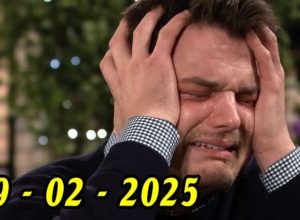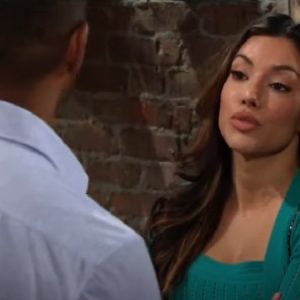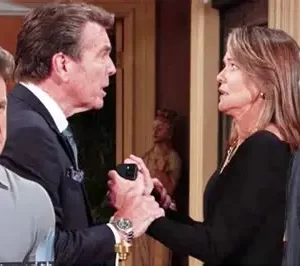The air in Victor Newman’s hallowed office, usually thick with the scent of power and unyielding control, had never felt so thin, so suffocating. The words, uttered with chilling calm by Aristotle Dumas, weren’t a shout, but a whisper that ripped through the very fabric of Victor’s iron will. No threats, no grand gestures, just five simple words that articulated a terrifying truth: the great Victor Newman, the Moustache, the titan of Genoa City, was no longer in charge of his own destiny. For the first time in decades, Victor felt a raw, primal fear, a panic he couldn’t mask, even from himself.This was no ordinary boardroom battle, no familiar corporate raid. This was a storm unlike any the Newman family had ever known, one born not from a rival’s ambition, but from a deadly secret held by an outsider. When Aristotle Dumas quietly slipped into Genoa City, no one, least of all Victor, suspected that this unassuming figure held the fate of the mighty Newman in his hands. Like a patient, calculating predator, Dumas had not rushed his strike. He had observed, collected, meticulously recording the hidden moments where Victor’s true face, stripped bare of his powerful facade, was exposed. A recording, a photo, a few damning archives – Dumas wielded them like sharpened knives, each one poised to dissect Victor’s life, threatening to spill everything to the media and the relentless arm of the law. The crimes Victor had so carefully buried beneath mountains of fame and fortune were no longer contained. In that moment of chilling confrontation, Victor, who once made empires tremble, became a trembling prey before a silent, ruthless hunter.Dumas laid down his terms with an almost surgical precision: Victor would obey his every command, or every dirty secret, every buried transgression, would be dragged into the unforgiving light. The humiliation burned hotter than any anger Victor had ever known. For the first time in decades, the lion had to beg. He had to bow his head, agreeing to terms that savaged his self-respect and contradicted his very philosophy of life. This was an unprecedented degradation, a bitter pill that Victor was forced to swallow to avert complete collapse. Each step he took under Dumas’s thumb felt like a descent closer to an inescapable abyss.But the torment didn’t end with Dumas. The internal turmoil, the crushing pressure of being manipulated, the profound humiliation of being controlled transformed Victor. He was no longer the imposing symbol of cold, calculated power. Instead, he became a man losing his grip, constantly making impulsive, irreparable mistakes. The Newman family, once Victor’s most secure kingdom, was now a breeding ground for the chaos and doubt he inadvertently sowed. Victor’s shadow had always been immense, but now, as he faltered, it dragged everyone connected to him into a chaotic vortex. Those who had once fiercely protected and even idolized him could barely recognize the man he was becoming.

The crescendo of this internal disintegration arrived when Michael Baldwin, his long-time friend, confidant, and last true anchor, finally chose to walk away. This left Victor utterly alone, with no one left to temper the escalating fury that consumed him. Without Michael, Victor began a terrifying slide down a path of self-destruction. He plunged into uncontrolled confrontations, unleashing not just psychological attacks but also physical force and vicious revenge against Jack Abbott, his perpetual rival. Kyle Abbott, once a strategic ally, became an unwilling victim, bearing the full brunt of Victor’s unbridled rage. Despite urgent dissuasion from those around him, Victor’s wrath knew no bounds, extending even to Billy Abbott, turning him into a new enemy, simply to sate his endless fury.
The Newman family could no longer stand by and watch. As Victor continued to wound those who were once friends, partners, and members of powerful business families, they began to question if he had finally crossed an unforgivable line. Nikki Newman, heartbroken, witnessed the man she had loved so passionately become a ghost of himself, a man unable to control his own spiraling darkness. Victoria Newman, the daughter on whom Victor had once placed all his hopes, now found herself an unwilling adversary. She realized that if she didn’t act, the entire family would be swallowed by Victor’s escalating madness. The agonizing question hung heavy in the opulent Newman mansion: could the family stand united against Victor, a man who had always held absolute power? They were forced to choose between family loyalty and their own safety, between love and reason, between a glorious past and a cruel, fracturing reality.
In the midst of this family implosion, Victor ignited yet another volatile conflict by deliberately meddling in the budding relationship between Clare Grace Newman and Kyle Abbott. Recognizing Clare, the newly adopted niece, drawing closer to Kyle, Victor perceived this as a potential threat to the Newman power structure. He secretly plotted to separate them, deploying every means to protect what remained of his personal influence. To achieve this, Victor cunningly assigned Audra Charles, a clever but ambitious woman, a secret mission: sow doubt and conflict, destroy the fragile trust between Clare and Kyle before their connection could blossom into a real threat to his control.
Victor Newman, a formidable symbol of power and intrigue who had repeatedly steered his family and corporation through countless storms, was now caught in an unprecedented spiral of self-inflicted revenge. As time wore on, the wounds and hatred festering within him intensified, leading to reckless decisions that shocked all of Genoa City. Old enemies, once seemingly settled, now eyed him with wary caution as his anger blazed like an untamed inferno. The only person who had ever truly reined in Victor was Michael Baldwin, his long-time friend, confidant, and the sole anchor that kept him from plunging deeper into the abyss of hatred. But with Michael’s departure, that vital restraint vanished. Without anyone to hold him back, Victor sank further into his own darkness. Revenge became a relentless, thoughtless pursuit, heedless of consequences or the relationships painstakingly built over years. Nikki painfully watched her husband drift further and further from reality. The more she tried to control him, the more she realized her utter powerlessness. Sometimes, Nikki felt a chilling fear of the very man she had once given her life to. Their conversations grew tense, Nikki’s every piece of advice dismissed, even twisted into an excuse for Victor to unleash his fury. Nikki was left with no choice but to pray for a miracle, for Victor’s return.
Victor lived in a constant state of vigilance, haunted by Dumas like an inescapable shadow. He felt besieged, his every decision stemming from the paralyzing fear of losing everything. He grew suspicious of everyone, even his closest loved ones, trusting only his own strength, ignoring advice, even family affection. Victor incessantly plotted revenge, a desperate attempt to reassure himself that he was still in control. But the more he attacked, the lonelier he felt, the more he lost control. His rage, once directed at his enemies, began to spread to his friends, relatives, anyone who expressed doubt or defied his will. Without Michael, Victor was terrifyingly vulnerable to spiraling into revenge and self-destruction. Nikki was increasingly pushed to the periphery of Victor’s life, able to do nothing but watch the man she loved sink deeper into darkness. She had once believed her love was strong enough to change him, but now Nikki felt utterly helpless, even hopeless.
On the other side, Michael, despite leaving his direct role, silently monitored the unfolding catastrophe. He knew Victor was losing control, knew his former boss was hurtling towards self-inflicted disaster if no one intervened. Michael often considered returning to help, but he also understood that true help could only come if Victor acknowledged his own limits. Michael remained an observer, occasionally sending subtle, hidden messages, desperately hoping Victor would awaken. But all efforts proved futile against Victor’s stubbornness and growing fear. The situation worsened as Victor’s revenge extended beyond his enemies to those who were once friends, allies, and even family. Victor could no longer distinguish the line between hatred and affection, between justice and revenge, between protection and destruction. In her sleepless nights, Nikki often wrestled with the agonizing question: should she leave Victor to save herself, or continue to stay, clinging to the faint hope that her beloved husband would one day return from the abyss?
Ultimately, Victor faced a stark, terrifying reality. No one could save him but himself. Michael’s departure, Nikki’s profound disappointment and pain, the turning away of those once loyal – all resonated into a deafening wake-up call, forcing Victor to look inward. But before he truly understood, he had pushed his family and himself to the very brink of collapse, leaving behind wounds that would not heal in everyone’s hearts. In a city where loyalty, hatred, and power intertwine inextricably, Victor Newman now stood as a tragic testament to the price of losing control, of allowing hatred to guide him instead of reason and love. And whether someone returns to help him, whether Michael reaches out once more, or Nikki continues her patient vigil, only when Victor truly accepts change can the oppressive darkness within his mind be lifted, and the light of hope begin to glimmer for the Newman family.
The atmosphere in the Newman mansion is now thick with tension and hidden conflicts. While outwardly maintaining the polished, polite facade of one of Genoa City’s most powerful families, behind closed doors, confrontations, power struggles, conspiracies, and secret fears are escalating at an alarming pace. Nikki remains deeply troubled by Victor’s increasingly controlling grip on family members, especially his targeting of Clare and Kyle’s budding relationship. Nikki clearly feels a profound unease, watching Victor secretly influence and intervene to create a rift between two young people who desperately need their family’s support and tolerance. Nikki knows that just one thoughtless decision from Victor could permanently destroy the trust and love they’ve worked so hard to rebuild.
Nikki’s insecurities became impossible to hide, leading her to confide in Victoria—the mature, strong daughter who had endured the most pain from Victor’s control. Nikki carefully chose her words, expressing her fear that Victor would ruin Clare and Kyle’s happiness, knowing Victoria was always wary of her father’s every move. The confession unfolded in the soft yellow light of a room filled with sadness, anxiety, and unspoken sympathy. Nikki didn’t want Victoria to rebel; she merely hoped her daughter could restrain Victor once more before things spiraled too far. But that confession ignited an undercurrent that had long waited to explode in Victoria’s heart. Years of broken marriages, unsalvageable relationships, and a heart repeatedly shattered by her father’s harsh interventions—all those painful memories had never truly slept. Now, as Victoria watched Victor repeat the same mistakes, her patience and forgiveness had worn thin. She knew that if she didn’t speak up, Clare—her sister, newly reunited after countless storms, timidly building her own future—would be the next victim. Victoria felt a profound responsibility to protect Clare, to end the cycle of tragedy Victor had always imposed on his children’s lives.
That very night, Victoria didn’t hesitate to confront her father. She entered Victor’s office, carrying a potent mix of anger and despair—a feeling only understood by those who had experienced betrayal from loved ones. Victoria’s words were resolute, no longer sugar-coated, no longer maintaining any pretense of courtesy between father and daughter. She warned him: if he dared to destroy the relationship between Clare and Kyle, if he continued to impose his will on Clare’s life, she would never forgive him. Tension crackled throughout the room. Each sentence, each word, was like a cold knife, striking directly at the illusion of control Victor had meticulously built for himself. Victor, accustomed to every family member bowing to his iron will, faced a determined Victoria this time, and he couldn’t help but feel bewildered. Deep down, he knew Victoria was right. He had violently interfered in almost all her relationships, resulting in irreparable brokenness, times when Victoria had to rise from the ashes caused by her own father. Victor used to believe he acted out of love, to protect his daughter from harm. But with every retrospective glance, he realized he had unintentionally become the source of Victoria’s deepest pain. And now, seeing Clare, his niece, who had just found a home, caught in that same vortex of control, Victor knew he was repeating his past mistakes. But he couldn’t stop, driven by insecurity, the fear of losing his loved ones, the obsession that if he didn’t control, the whole family would fracture again. Victoria wasn’t just angry; she seethed with an unyielding will to protect Clare at all costs, to stop her father before it was too late. She vowed that even if it meant confronting him, even if it cost their relationship, she would not let Clare suffer the pain she had endured. Victoria decided this time she would not back down, would not compromise, would not tolerate any more interference. Clare deserved the chance to love and choose happiness, not to become a victim of controlling ambition or the invisible fears of her predecessors.





